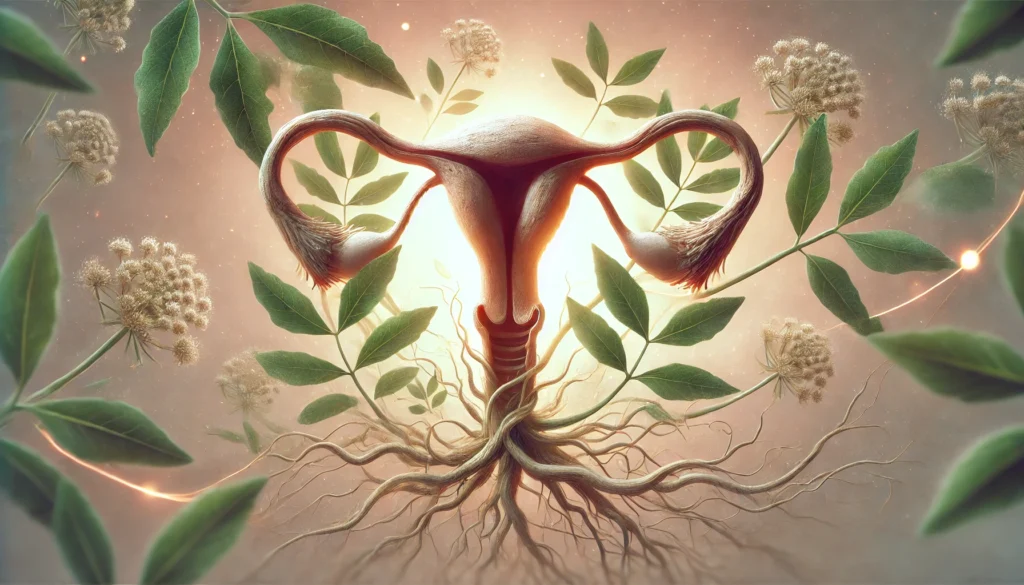Introduction
Ashwagandha, an adaptogenic herb widely used in Ayurvedic medicine, has gained popularity for its potential to alleviate stress, balance hormones, and improve overall well-being. Women, in particular, are turning to ashwagandha for menstruation-related concerns, seeking relief from premenstrual syndrome (PMS), premenstrual dysphoric disorder (PMDD), and menstrual cycle irregularities. However, questions persist about ashwagandha’s effect on menstrual cycle regulation and whether it may cause unintended disruptions. Some individuals even report that ashwagandha stopped their period entirely, raising concerns about its impact on reproductive health. This article explores the scientific evidence behind ashwagandha’s influence on menstruation, clarifying whether it is beneficial for PMS and PMDD, and addressing potential risks such as heavy periods or cycle irregularities. By evaluating available research, traditional uses, and expert opinions, we aim to provide a comprehensive analysis of ashwagandha’s role in menstrual health.
You may also like: Rhodiola vs. Ashwagandha: Which Adaptogen Best Supports Gut Health and a Fiber-Rich Diet?
Understanding Ashwagandha’s Role in Hormonal Balance
The endocrine system plays a critical role in regulating menstrual cycles, and hormonal imbalances can contribute to various menstrual disorders. Ashwagandha, scientifically known as Withania somnifera, is classified as an adaptogen, meaning it helps the body adapt to stress and restore balance. One of its primary mechanisms involves modulating cortisol levels, the body’s primary stress hormone. High cortisol levels can interfere with the hypothalamic-pituitary-gonadal (HPG) axis, which governs reproductive hormones, potentially leading to irregular periods, missed cycles, or worsening PMS symptoms.
Research indicates that ashwagandha supports adrenal health by reducing chronic stress and mitigating the effects of excessive cortisol production. Since elevated cortisol can suppress reproductive hormones like estrogen and progesterone, lowering stress levels may indirectly improve menstrual cycle regularity. Furthermore, ashwagandha has been shown to influence thyroid function, and since the thyroid gland is essential for reproductive health, its effects may extend to overall menstrual regulation.

Ashwagandha for PMS: Can It Alleviate Symptoms?
Premenstrual syndrome (PMS) affects millions of women, causing mood swings, bloating, fatigue, headaches, and irritability in the days leading up to menstruation. Since stress exacerbates PMS symptoms, ashwagandha’s stress-relieving properties could help manage these discomforts. Studies suggest that ashwagandha enhances mood stability by regulating neurotransmitters such as serotonin and dopamine, which play crucial roles in emotional well-being.
Additionally, inflammation is a significant factor in PMS-related discomfort. Ashwagandha possesses anti-inflammatory properties that may reduce menstrual pain and cramping. Some research also indicates that ashwagandha improves sleep quality, which can be beneficial for women who experience fatigue and insomnia as part of their PMS symptoms. By addressing both the psychological and physiological aspects of PMS, ashwagandha may provide a natural alternative for managing premenstrual discomfort.
Can Ashwagandha Help with PMDD?
Premenstrual dysphoric disorder (PMDD) is a severe form of PMS characterized by debilitating mood disturbances, severe anxiety, and depression-like symptoms. While PMDD is less common than PMS, it significantly impacts daily life and requires effective management strategies. Since stress and cortisol dysregulation are closely linked to PMDD, ashwagandha’s ability to lower cortisol levels makes it a promising option for alleviating symptoms.
Emerging evidence suggests that ashwagandha acts as a natural anxiolytic, helping to reduce anxiety and depressive symptoms. Some clinical trials indicate that it enhances the function of gamma-aminobutyric acid (GABA) receptors, which play a role in calming the nervous system. Given that PMDD is closely associated with serotonin imbalances, ashwagandha’s influence on neurotransmitter regulation may help stabilize mood and lessen the severity of PMDD symptoms. However, more research is needed to confirm its efficacy specifically for PMDD treatment.
Does Ashwagandha Affect Your Period?
One of the most common concerns among women considering ashwagandha supplementation is whether it affects the menstrual cycle. While some users report positive outcomes, such as improved cycle regularity and reduced PMS symptoms, others claim that ashwagandha stopped their period or led to irregular cycles. The variability in responses may be attributed to individual hormonal differences and underlying health conditions.
Ashwagandha’s impact on menstruation is likely due to its influence on hormonal pathways, including the HPG axis and thyroid function. Women with pre-existing hormonal imbalances, such as polycystic ovary syndrome (PCOS) or hypothyroidism, may experience different effects compared to those with regular cycles. Additionally, excessive dosages of ashwagandha could disrupt hormone levels, potentially leading to menstrual irregularities. Therefore, it is essential to consult a healthcare professional before using ashwagandha to manage menstrual health.
Can Ashwagandha Cause Heavy Periods?
Another concern is whether ashwagandha can cause heavy periods, known medically as menorrhagia. While limited scientific evidence directly links ashwagandha to increased menstrual flow, its effects on blood circulation and hormonal balance may contribute to changes in menstrual patterns. Some women report heavier periods after starting ashwagandha, possibly due to its impact on estrogen levels and uterine function.
On the other hand, ashwagandha’s anti-inflammatory properties could theoretically reduce excessive bleeding by modulating prostaglandin activity, which plays a role in uterine contractions. Given these conflicting reports, more research is needed to determine how ashwagandha affects menstrual bleeding patterns. Women experiencing abnormal menstrual flow should monitor their symptoms and consult a healthcare provider for personalized advice.

Frequently Asked Questions (FAQ) on Ashwagandha and Menstrual Health
1. How does ashwagandha affect the menstrual cycle?
Ashwagandha’s effect on menstrual cycle regulation is primarily linked to its ability to lower cortisol, the body’s stress hormone. High cortisol levels can disrupt the hypothalamic-pituitary-gonadal (HPG) axis, which is responsible for maintaining hormonal balance, potentially leading to irregular periods. By reducing stress and supporting adrenal function, ashwagandha may promote a more predictable cycle in some individuals. However, hormonal regulation is highly individualized, and while some women experience improved cycle regularity, others report changes such as longer or shorter cycles. Understanding how ashwagandha for menstruation works in the body requires assessing personal health conditions and consulting with a healthcare professional before making it a regular supplement.
2. Can ashwagandha help alleviate PMS symptoms?
Ashwagandha for PMS relief is often recommended due to its adaptogenic properties, which help modulate stress response and improve overall well-being. One of its primary mechanisms is balancing neurotransmitters such as serotonin and dopamine, which influence mood stability and emotional regulation. Additionally, ashwagandha’s anti-inflammatory properties may reduce bloating and menstrual cramps by lowering prostaglandin levels, compounds that contribute to uterine contractions. Improved sleep quality is another benefit, as disrupted sleep is a common issue for women experiencing PMS. While individual responses may vary, many women report that incorporating ashwagandha into their routine leads to noticeable relief from PMS-related symptoms.
3. Is ashwagandha effective for managing PMDD?
Ashwagandha PMDD support is an emerging area of interest due to its influence on the nervous system and hormonal stability. PMDD, a severe form of PMS, is often linked to extreme fluctuations in estrogen and progesterone levels, which can trigger mood disturbances and severe anxiety. Ashwagandha’s ability to enhance GABA receptor function may contribute to a calming effect, reducing the intensity of emotional distress associated with PMDD. Additionally, by promoting balanced cortisol levels, ashwagandha may prevent excessive hormonal swings that exacerbate PMDD symptoms. While clinical research specifically on ashwagandha and PMDD remains limited, its stress-reducing properties make it a promising natural remedy for symptom management.
4. Can ashwagandha cause heavy periods?
The concern of whether ashwagandha causes heavy periods stems from its potential effects on hormone regulation and blood circulation. While some individuals report heavier flow after taking ashwagandha, scientific evidence on this phenomenon remains inconclusive. Since ashwagandha supports thyroid function and influences estrogen levels, its effects on menstrual flow may vary depending on individual hormonal balance. Women who naturally experience lighter periods may not notice significant changes, while those prone to heavy bleeding should monitor their symptoms carefully. If ashwagandha appears to increase menstrual flow beyond a comfortable level, adjusting the dosage or discontinuing use may be necessary.
5. Why do some women report that ashwagandha stopped their period?
Cases where women claim that ashwagandha stopped their period are likely linked to its influence on stress hormones and reproductive function. When cortisol levels drop significantly, the body may temporarily adjust hormone production, potentially delaying ovulation and leading to missed periods. Additionally, women with existing hormonal imbalances, such as PCOS or thyroid dysfunction, may be more susceptible to menstrual irregularities after taking ashwagandha. The dosage and duration of use also play critical roles in determining how ashwagandha interacts with the reproductive system. If menstrual cycles become irregular after starting ashwagandha, it is advisable to consult a healthcare provider to assess the underlying cause.
6. Does ashwagandha support fertility and reproductive health?
Ashwagandha is widely recognized for its role in supporting fertility by enhancing hormonal balance, improving stress resilience, and promoting overall reproductive health. By modulating cortisol levels, it creates a more favorable environment for ovulation and hormone regulation. Some studies suggest that ashwagandha improves ovarian function by increasing blood flow to reproductive organs, which may enhance egg quality and menstrual regularity. Additionally, ashwagandha’s impact on thyroid health plays an indirect role in fertility, as an underactive or overactive thyroid can disrupt ovulation. However, because hormonal responses vary, women actively trying to conceive should monitor their cycles closely while using ashwagandha.
7. How long does it take for ashwagandha to regulate menstrual cycles?
The time required for ashwagandha to show measurable effects on the menstrual cycle depends on individual health conditions, stress levels, and hormone imbalances. Some women notice improvements in cycle regularity within a few weeks, while others require several months of consistent use. Because ashwagandha works primarily by modulating the body’s stress response, long-term benefits are often cumulative rather than immediate. Regular use, combined with a healthy diet and lifestyle, can enhance its efficacy in supporting menstrual health. Women seeking specific changes in their cycle should consider tracking their symptoms over time to determine whether ashwagandha is providing the desired effects.
8. Can ashwagandha interact with birth control or hormonal therapy?
Women taking hormonal birth control or undergoing hormone therapy should exercise caution when using ashwagandha, as it may interact with synthetic hormone levels. Since ashwagandha affects the endocrine system, it has the potential to either enhance or diminish the effectiveness of hormonal medications. Some research suggests that adaptogens like ashwagandha may influence estrogen metabolism, which could impact birth control efficacy. Women using hormonal contraception should consult their healthcare provider before incorporating ashwagandha into their regimen. Understanding how ashwagandha and menstrual cycle dynamics interact with synthetic hormones is essential for making informed decisions about supplementation.
9. Are there specific dosages of ashwagandha recommended for menstrual health?
The optimal dosage of ashwagandha for menstruation varies based on individual needs, body weight, and overall health status. Typical dosages range between 300 to 600 mg per day, with higher doses sometimes used for stress-related conditions. Women seeking menstrual regulation may benefit from taking ashwagandha consistently for at least three months to evaluate its effects. It is advisable to start with a lower dose and gradually increase as needed, while monitoring any changes in menstrual patterns. Since excessive intake may lead to unwanted side effects, consulting a healthcare professional for personalized recommendations is always the safest approach.
10. Should women with existing hormonal conditions take ashwagandha?
Women with pre-existing hormonal conditions such as PCOS, endometriosis, or hypothyroidism should approach ashwagandha supplementation with careful consideration. While some studies suggest that ashwagandha supports hormonal balance, its effects may vary depending on the individual’s condition. For example, ashwagandha’s ability to enhance thyroid function could be beneficial for some but problematic for those with hyperthyroidism. Additionally, women with estrogen-sensitive conditions should consult their doctor before using ashwagandha, as it may influence estrogen metabolism. Understanding the nuances of ashwagandha effect on menstrual cycle regulation is crucial for women managing complex hormonal disorders.

Conclusion: Should You Use Ashwagandha for Menstrual Health?
Ashwagandha offers numerous potential benefits for menstrual health, including stress reduction, hormone balance, and relief from PMS and PMDD symptoms. Its adaptogenic properties make it a valuable natural remedy for women seeking holistic support for menstrual cycle regulation. However, individual responses vary, and some users report disruptions in their menstrual cycle, including missed periods or increased menstrual flow.
Before incorporating ashwagandha into a menstrual health regimen, it is crucial to consider personal health history, existing hormonal conditions, and appropriate dosage. Consulting with a healthcare professional can help determine whether ashwagandha is a suitable option based on individual needs. While more research is needed to fully understand ashwagandha’s effects on menstrual cycles, its role as a stress-relieving and hormone-balancing herb makes it a promising candidate for women experiencing menstrual discomfort. As with any supplement, informed decision-making and careful monitoring are essential to achieving optimal health outcomes.
Further Reading:
How Women Are Using Ashwagandha to Transform Their Health
Ashwagandha Benefits for Women’s Health
herbal remedies for women, menstrual cycle support, adaptogens for hormone balance, natural supplements for PMS, holistic menstrual health, stress relief and hormones, Ayurvedic herbs for women, managing period symptoms, hormone regulation naturally, menstrual wellness supplements, cortisol and reproductive health, plant-based hormone therapy, balancing estrogen naturally, thyroid health and menstruation, alternative treatments for PMDD, menstrual pain relief herbs, fertility-boosting supplements, natural remedies for heavy periods, stress management and cycles, endocrine system balance
The information contained in this article is provided for general informational purposes only and is not intended to serve as medical, legal, or professional advice. While NewsHealthWatch strives to present accurate, up-to-date, and reliable content, no warranty or guarantee, expressed or implied, is made regarding the completeness, accuracy, or adequacy of the information provided. Readers are strongly advised to seek the guidance of a qualified healthcare provider or other relevant professionals before acting on any information contained in this article. NewsHealthWatch, its authors, editors, and contributors expressly disclaim any liability for any damages, losses, or consequences arising directly or indirectly from the use, interpretation, or reliance on any information presented herein. The views and opinions expressed in this article are those of the author(s) and do not necessarily reflect the official policies or positions of NewsHealthWatch.

